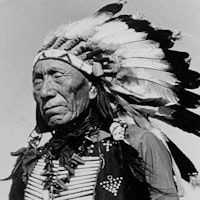The Great Spirit is everywhere; He hears whatever is in our minds and hearts, and it is not necessary to speak to Him in a loud voice.
The Great Spirit is everywhere; He hears whatever is in our minds and hearts, and it is not necessary to speak to Him in a loud voice.
Black Elk [Heȟáka Sápa]

In a Loud Voice
Theme: Prayer
The Great Spirit is everywhere; He hears whatever is in our minds and hearts, and it is not necessary to speak to Him in a loud voice.
Heȟáka Sápa, commonly known as Black Elk, was born in December 1863 along the Little Powder River in what is now Wyoming. He was a member of the Oglala Lakota (Sioux) and a second cousin to the renowned war leader Crazy Horse. From a young age, Black Elk experienced profound spiritual visions that would shape his life and destiny. At the age of nine, during a severe illness, he had a vision in which he encountered the Six Grandfathers, spiritual beings who bestowed upon him gifts and powers, including the ability to heal. This vision set him on the path to becoming a wičháša wakȟáŋ, or holy man, a role he embraced throughout his life.
Black Elk's life was marked by significant historical events and personal transformations. He participated in the Battle of the Little Bighorn in 1876 and witnessed the tragic Wounded Knee Massacre in 1890. In the late 1880s, he traveled to Europe with Buffalo Bill's Wild West Show, where he sought to understand the ways of the white people. Upon returning to the United States, he became involved in the Ghost Dance movement, which aimed to restore the Native American way of life. Despite the suppression of this movement, Black Elk continued to serve his people as a healer and spiritual leader, blending traditional Lakota practices with his later conversion to Catholicism in 1904. He became a catechist, teaching Christianity while maintaining his Lakota spiritual beliefs.
Black Elk's legacy extends beyond his lifetime through his contributions to literature and spiritual teachings. His autobiographical accounts, shared with poet John G. Neihardt and anthropologist Joseph Epes Brown, were published in the influential works "Black Elk Speaks" and "The Sacred Pipe." These books have inspired generations and contributed to the revival of Native American culture and spirituality. Black Elk's ability to integrate his Lakota heritage with his Christian faith exemplifies his resilience and adaptability. His life and teachings continue to resonate, symbolizing a bridge between cultures and a testament to the enduring spirit of the Lakota people.
Wilson, Andrew, editor. World Scripture - a Comparative Anthology of Sacred Texts. Paragon House, 1991, p. 594 [Black Elk (Heȟáka Sápa)].

Black Elk [Heȟáka Sápa]
Theme: Prayer

Black Elk, Heháka Sápa
Resources
Related Quotes
Copyright © 2017 – 2026 LuminaryQuotes.com About Us